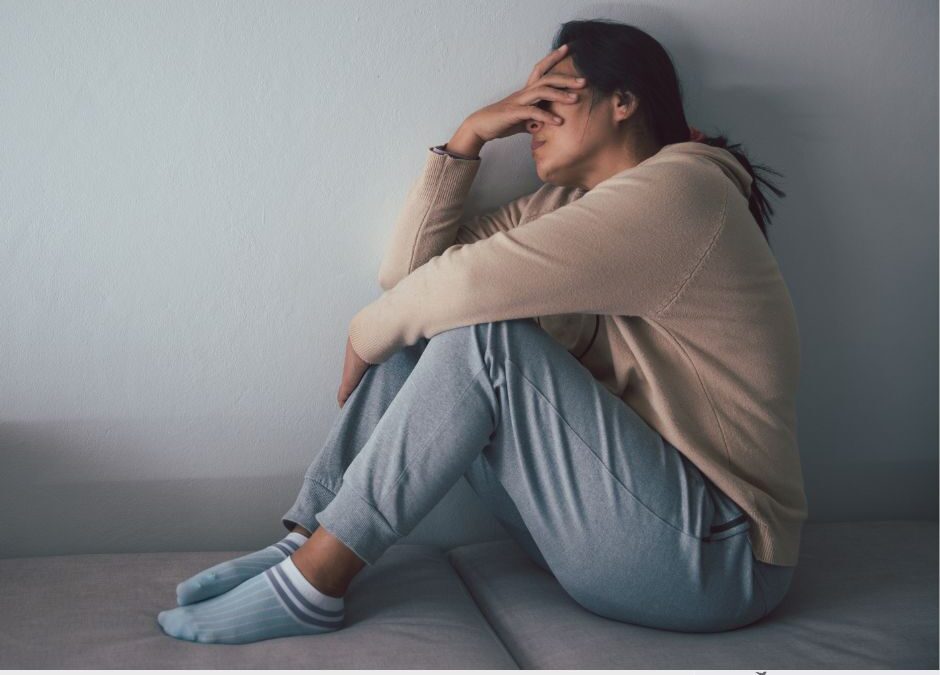Do you sometimes feel anxious? You know, that uneasy feeling in your chest, the fast-beating heart, and all those thoughts swirling around your head? It’s something many of us experience. But for women living abroad, anxiety can feel even more intense.
It’s like a shadow that won’t leave you alone, always tagging along wherever you go. It’s there when you’re excited about new adventures, but it also creeps in when you’re unsure about what’s next. This anxiety can make life as an expat feel like a bumpy ride, full of ups and downs.
In this blog post, let’s explore the complex interplay of culture, identity, and circumstance that makes anxiety in expat women so common. I’ll also share ways to handle anxiety more effectively, so that you can live a more empowered life, free from its shackles!
Why Women Are More Prone to Anxiety
Anxiety can be a real struggle, especially for women. Did you know that according to scientific research, women are actually twice as likely as men to experience anxiety?
The reasons for this are manifold: Biologically, hormonal fluctuations unique to women play a pivotal role in our susceptibility to anxiety. Estrogen and progesterone, among other hormones, can influence brain chemistry, affecting mood regulation and emotional responses. Furthermore, women often face psychological stressors rooted in societal expectations and gender roles, which can trigger feelings of anxiety.
Interestingly, recent studies, including one conducted by the National Institutes of Health (NIH), have demonstrated a correlation between anxiety and intelligence. Could it be that anxiety is a silent pandemic among intelligent women?
Life Abroad: A Trigger for Anxiety in Expat Women
Living abroad as a woman brings a unique set of challenges that can intensify feelings of anxiety. Navigating a different culture and way of life can feel like being thrown into a foreign land without a map. Expat women often find themselves comparing their own experiences to those of the locals or friends back home, even though the two are incomparable. This constant comparison can lead to feelings of inadequacy and self-doubt, fueling the flames of anxiety.
Starting over in so many ways adds another layer of complexity to the expat experience. From building new social circles to finding employment, every aspect of life requires adjustment and adaptation, which can contribute to feelings of anxiety. Also, lacking a stable support system can intensify these feelings, leaving expat women feeling isolated and alone in their struggles.
Some grapple with doubts about their decision to move or stay abroad, questions of identity, and belonging – all of which poses yet another trigger.
Let’s not forget that in many countries, there’s a heavy stigma surrounding mental health, making it difficult to talk about. Add to that the challenge of expressing your most vulnerable side in a foreign language, which is quite a barrier to overcome. And yet, it’s by reaching out for support and sharing your experiences, that you can find strength in vulnerability and solidarity.
Acknowledging the challenges and seeking support is the first step towards mental well-being. Whether through (online) Expat Coaching, joining support groups, or simply confiding in friends and loved ones, expat women have an array of resources at their disposal.
First Aid for Anxiety in Expat Women
Becoming aware of and coping with anxiety starts with recognizing its signs and symptoms:
Pay attention to the physical cues that anxiety presents. Notice if your heart races, if you feel tense, or if you experience sensations like breathlessness or nausea. How does anxiety feel in your body? What are the typical symptoms that accompany it?
Next, try to identify the thought that triggered that unpleasant feeling in you. Because it’s always a thought that triggers the feeling; sometimes a conscious one, sometimes an unconscious one, other times a very internalized belief you don’t even question anymore. Write down that thought, and analyze and challenge it by asking the following questions:
- Is this really true?
- Could I prove in court that this is true?
- Is there another way to look at this situation?
- What is one thing I can do right now to feel better, or to improve the situation?
- Who could help me out here?
Were you able to recognize the physical sensations that come with your feelings of anxiety, and the underlying thought that triggered it? If so, I celebrate you!
Experiencing anxiety doesn’t make you weak or inadequate. Refrain from judging yourself, and remember that it’s a natural response to stress and uncertainty. By acknowledging your anxiety and its symptoms, you empower yourself to take control of your mental health and begin the journey towards healing and self-acceptance.
Going Deeper: Your Anxiety Toolkit
To help you cope with anxiety the next time it takes over and clouds your head, I’ve created a free PDF with a bunch of helpful strategies for you! They can be easily applied regardless of the situation you find yourself in, and have proven highly effective in granting relief.
Lifestyle Do’s for Keeping Anxiety in Check
Sleep well
Ensuring you get enough rest is vital for maintaining optimal mental health. A good night’s sleep is essential for cognitive function, mood regulation, and overall well-being. Without sufficient rest, you may find yourself more prone to stress and anxiety. Sleep deprivation can exacerbate feelings of tension and overwhelm.
It can help to create a relaxing bedtime routine: avoiding screens before bed, practicing relaxation techniques like deep breathing or meditation, and ensuring your sleeping environment is comfortable and conducive to rest.
If your small kids are keeping you up at night, make sure you can carve out the time to catch up on sleep at another time: who could take care of your little one(s) while you take a nap during the day? It takes a village, as you know, so (even if you live abroad) don’t think you need to do this alone!
A healthy diet
Next up, let’s talk about a healthy diet: getting the right nutrients is crucial for managing anxiety levels, and for your body and mind to function optimally. Deficiencies in key vitamins and minerals can impact mood and mental well-being. Incorporating a variety of fruits, vegetables, whole grains, lean proteins, and healthy fats into your meals provides your body with the necessary nutrients. These support brain health and emotional stability.
Also, don’t forget to stay hydrated by drinking plenty of water throughout the day. And of course, be careful with that caffeine!
Self-Care
This is another thing you should integrate into your daily routine. Carving out regular quality time for activities that nourish, relax and comfort you can significantly enhance your mental well-being in the long run. Try engaging in activities like mindfulness, meditation, yoga, or journaling – all powerful tools for managing stress and fostering a sense of calm amidst the whirlwind of expat life. These practices allow you to ground yourself in the present moment, offering relief from the uncertainty and challenges you may experience.
Exercise
Another powerful antidote to anxiety, as it releases endorphins that elevate mood and reduce stress. Take a brisk walk, go for a run, or engage in your favorite form of exercise to help alleviate feelings of anxiety and tension.
Engage in Meaningful Activities
Last but definitely not least: keeping yourself busy and engaged in meaningful projects can be an excellent way to channel your energy constructively! Immersing yourself in activities that bring you joy and fulfilment not only serves as a distraction from anxious thoughts; it also allows you to channel your emotions into something productive. Having a sense of purpose and fulfilment is the ultimate contribution to your overall well-being!
Building Resilience Through Community and Connection
As expats, we often find ourselves far from our familiar support networks, but building connections and feeling supported is invaluable.
Connecting with other expat women can provide a sense of camaraderie and understanding, as they share similar experiences and challenges. Join expat groups, attend local events, or participate in online communities to find connections and build friendships. These connections not only offer emotional support but also provide practical advice and resources for navigating life abroad.
On the other hand, connecting with locals can be an excellent way to fostering a sense of belonging, safety and steadiness. While your expat friends may come and go – the locals are there to stay, plus they can be bridge-builders between you and the local culture and lifestyle.
Also, don’t forget to maintain relationships with friends and family back home ; this can offer a sense of continuity and stability in the midst of change. Regular chats with loved ones can provide comfort and reassurance, reminding you that – even though it may sometimes feel like it – you’re not alone on your journey.
Building a strong support system – locally and globally – goes a long way and will sustain you through the challenges of expat life!
You’ll also enjoy my podcast episode:
* Episode 79. How to Cope With Loneliness Abroad – with Phil McAuliffe
Let's Talk
I invite you to book a complimentary clarity session with me, to discuss what might be triggering your anxiety, how to cope and create a truly empowered life – wherever you are!
As your Coach I'll...
- help you to unravel your inner truth and connect you to your higher self
- hold the vision of your compelling future up high for you
- nudge you to look closer, dig deeper and to shift your perspectives
- motivate, encourage and hold you accountable.




